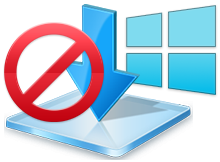I've been a longtime Windows 8 user, and on that OS it was extremely simple to just disable automatic updates. I hadn't had an update for years and it was amazing. I know a lot of you will have a borderline moral objection to this, so I have to write this big disclaimer. If you want the updates, fine. All I can say is I never got hacked or got any infection during that time because I know what I'm doing. Either way, on my own personal computer I should have the right to do what I want, and apparently Windows semi-understood this up until Windows 10. But now they've basically implemented full-on corporate authoritarianism where you don't even have the right to stop your computer from restarting whenever Microsoft remotely decides that it should. And it's cost me a lot of my data. Any thing stored in temporary memory is destroyed, my files get corrupted, and I've had to rebuild browser sessions and other projects from scratch. This is not right. If none of that bothers or scares you, fine, but I'm asking for help from people who understand where I'm coming from.
Now to my question. I've tried pretty much everything. I don't even care if it updates when I happen to shut the computer off, I just don't want it to interrupt my work to do it. I know you can disable updates for up to 7 days, but then it doesn't allow you to pause again, like it's literally your nanny or something. You can disable it for a longer period of time but again, you can only do it once and it only lets you do it up to a couple weeks. I've actually tried changing the date to months ahead of time, and then doing the two week update pause from that date, then changing the date back again. I thought I found the solution but it literally does nothing. It still says that updates are disabled until December 2023, but yet it still keeps updating and restarting. It's done it like three times since then. It just ignores it.
I've tried disabling the update service in services.msc, but it just turns it back on again unless you disable the Windows Update medic, which you can't even as an admin. I've downloaded nsudo in order to disable it, but the updates still manage to happen. I've even created a number of new registry keys as suggested by various websites. I can't even remember what they were but if you give me a suggested key to create I can tell you if I already have it or not. I think I've done them all. Again, it just gets ignored. The updates always happen no matter what you do. Is there really no way to do this? It's hard for me to imagine.
The only thing I've actually had any success with is downloading an autoclicker and remembering to put it on every time I leave the computer, but it's very difficult to remember to do that. I will say though ,if I'm not able to find a more elegant solution, i will be doing that meticulously from here on out. I am so sick of this and I'm not gonna lose any more data or accept this insanity any more.
Thanks for any help.
Now to my question. I've tried pretty much everything. I don't even care if it updates when I happen to shut the computer off, I just don't want it to interrupt my work to do it. I know you can disable updates for up to 7 days, but then it doesn't allow you to pause again, like it's literally your nanny or something. You can disable it for a longer period of time but again, you can only do it once and it only lets you do it up to a couple weeks. I've actually tried changing the date to months ahead of time, and then doing the two week update pause from that date, then changing the date back again. I thought I found the solution but it literally does nothing. It still says that updates are disabled until December 2023, but yet it still keeps updating and restarting. It's done it like three times since then. It just ignores it.
I've tried disabling the update service in services.msc, but it just turns it back on again unless you disable the Windows Update medic, which you can't even as an admin. I've downloaded nsudo in order to disable it, but the updates still manage to happen. I've even created a number of new registry keys as suggested by various websites. I can't even remember what they were but if you give me a suggested key to create I can tell you if I already have it or not. I think I've done them all. Again, it just gets ignored. The updates always happen no matter what you do. Is there really no way to do this? It's hard for me to imagine.
The only thing I've actually had any success with is downloading an autoclicker and remembering to put it on every time I leave the computer, but it's very difficult to remember to do that. I will say though ,if I'm not able to find a more elegant solution, i will be doing that meticulously from here on out. I am so sick of this and I'm not gonna lose any more data or accept this insanity any more.
Thanks for any help.




